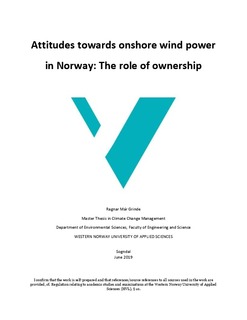| dc.description.abstract | Over the next two years, Norway stands to triple its production of onshore wind power electricity. This increase in production is not being spearheaded by Norwegian companies, but by foreign investors, constructing billions of kroners worth of onshore wind power installations across the country. While the government is focused on increasing Norway’s share of renewable energy and fulfilling its climate change mitigation goals, local opposition to wind power is growing, despite an overall positive attitude towards the technology nationally. This represents a considerable challenge to a swift energy transition. In this thesis, I analyse whether ownership models matter for people’s attitude towards a hypothetical onshore wind power project set in their home municipality, and whether ownership change negatively affects their attitude, regardless of the previous ownership model. This preference for the current state of affairs is known as a “status quo bias”. I used a two-stage framing experiment and a student sample. I find that people have a much more positive attitude towards the hypothetical wind power project if it has a national ownership model, as opposed to a foreign ownership model. However, I do find that people are less negative towards foreign ownership if it is introduced as the status quo ownership model. Although my overall statistics show that people react negatively to ownership change itself, supporting the existence of a status quo bias, I have other results that dispute this. I find that people only have a negative attitude to ownership change if the project’s goes from having a national- to a foreign ownership model, and not the other way around. I interpret this seeming lack of a status quo bias as being due to the two ownership model options not being of a somewhat equal value. This is because national ownership represents the traditional way of operating in the Norwegian energy industry, while foreign ownership represents an unknown path, with unclear consequences. Thus, they are not similar enough to produce a status quo bias. I conclude this paper by discussing the meaning and robustness of my findings, as well what policy implications they might have. | nb_NO |

